Australian Medicare Policy: History, Changes, and Welfare Effects
VerifiedAdded on 2023/05/30
|10
|2280
|425
Essay
AI Summary
This essay provides a comprehensive analysis of Australia's Medicare policy, tracing its origins from the Medibank initiative in 1975 to its evolution as a universal healthcare system in 1984. It examines significant governmental changes and amendments to the policy since 1999, including the introduction of private health insurance rebates and lifetime health cover, and assesses their effects on the welfare system and the Australian population. The essay highlights both the positive impacts, such as improved healthcare access for vulnerable groups like Aboriginal people and the aging population, and the negative aspects, including financial burdens and misconceptions about the quality of care compared to private insurance. Ultimately, it concludes that while the Medicare policy aims to provide health benefits for all Australians, ongoing challenges and adjustments are necessary to ensure its effectiveness and equity.
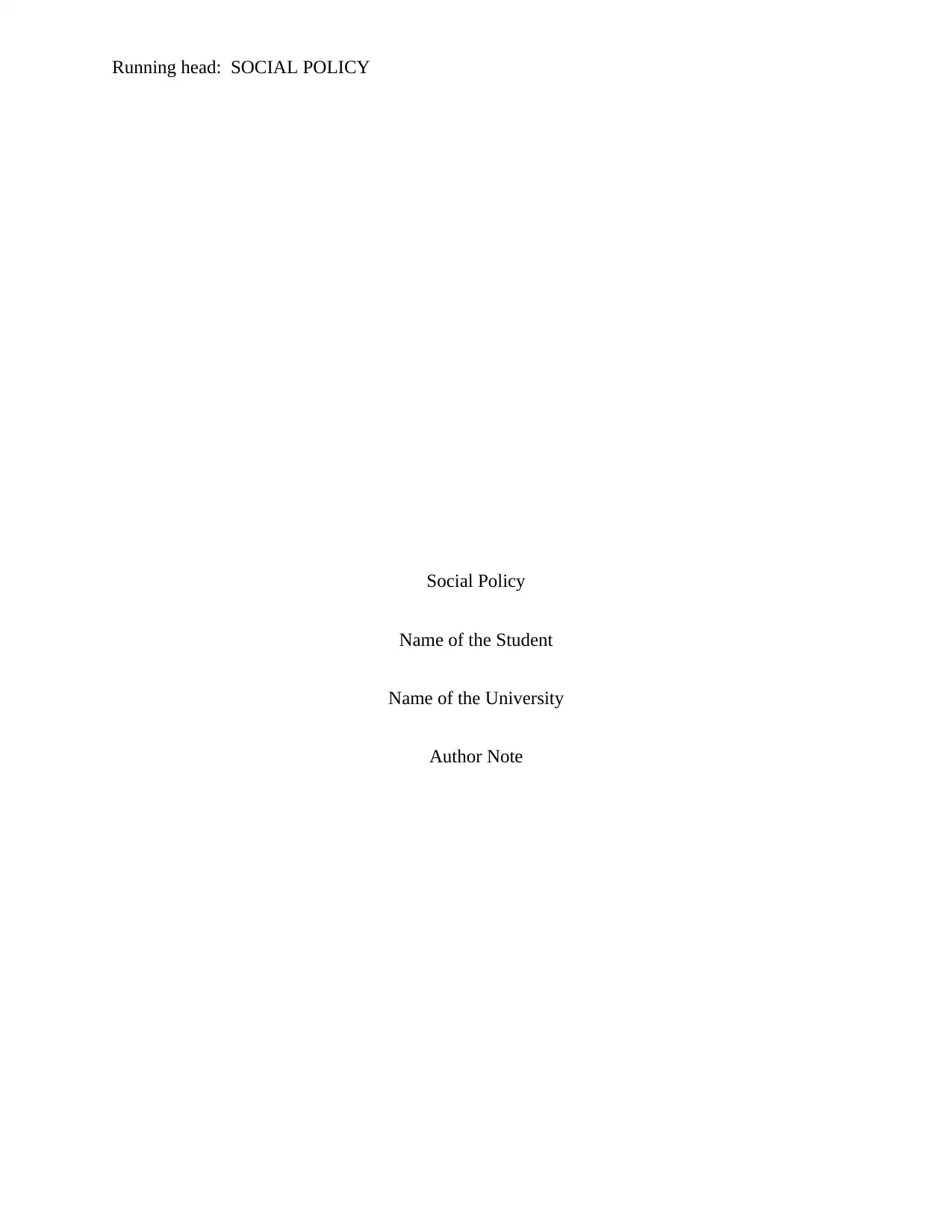
Running head: SOCIAL POLICY
Social Policy
Name of the Student
Name of the University
Author Note
Social Policy
Name of the Student
Name of the University
Author Note
Paraphrase This Document
Need a fresh take? Get an instant paraphrase of this document with our AI Paraphraser
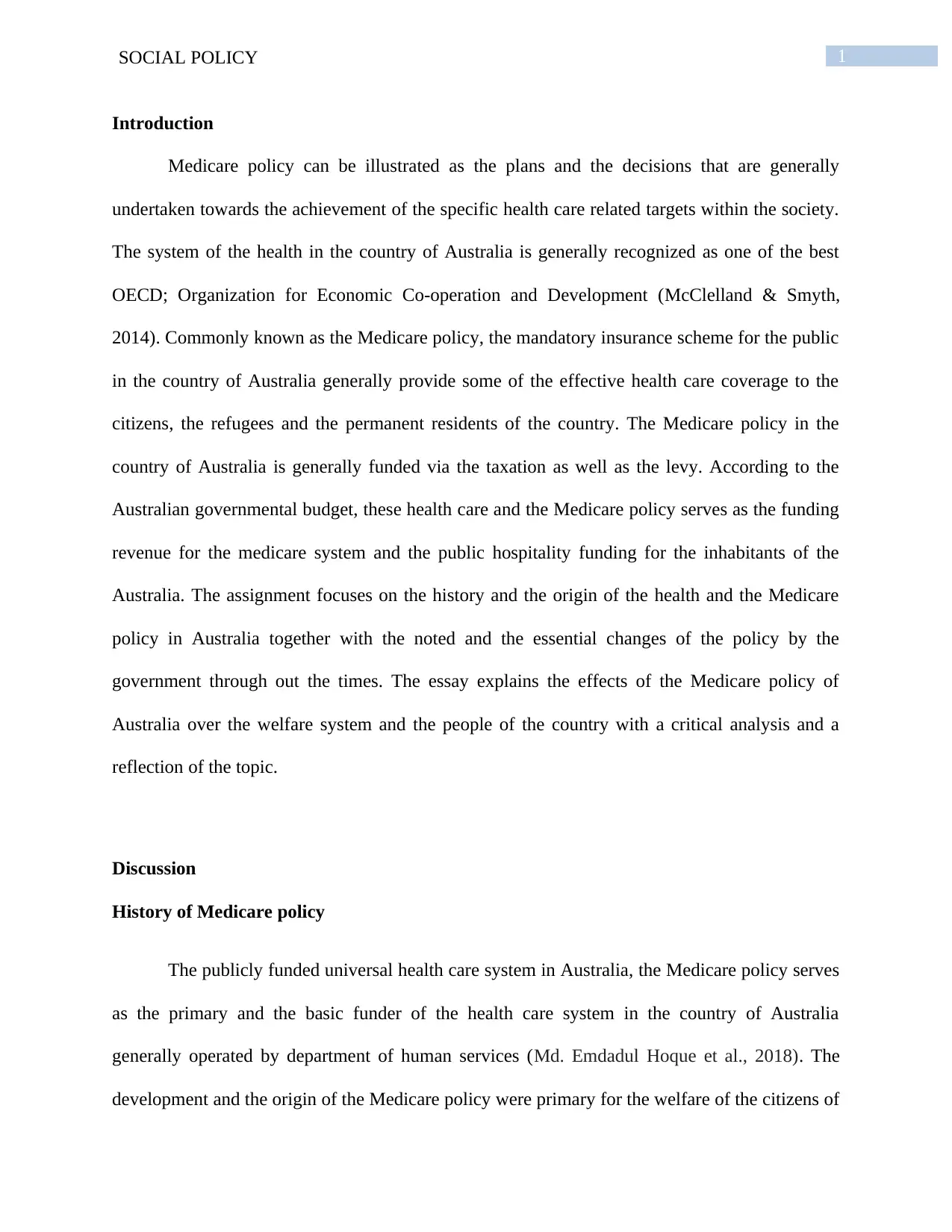
1SOCIAL POLICY
Introduction
Medicare policy can be illustrated as the plans and the decisions that are generally
undertaken towards the achievement of the specific health care related targets within the society.
The system of the health in the country of Australia is generally recognized as one of the best
OECD; Organization for Economic Co-operation and Development (McClelland & Smyth,
2014). Commonly known as the Medicare policy, the mandatory insurance scheme for the public
in the country of Australia generally provide some of the effective health care coverage to the
citizens, the refugees and the permanent residents of the country. The Medicare policy in the
country of Australia is generally funded via the taxation as well as the levy. According to the
Australian governmental budget, these health care and the Medicare policy serves as the funding
revenue for the medicare system and the public hospitality funding for the inhabitants of the
Australia. The assignment focuses on the history and the origin of the health and the Medicare
policy in Australia together with the noted and the essential changes of the policy by the
government through out the times. The essay explains the effects of the Medicare policy of
Australia over the welfare system and the people of the country with a critical analysis and a
reflection of the topic.
Discussion
History of Medicare policy
The publicly funded universal health care system in Australia, the Medicare policy serves
as the primary and the basic funder of the health care system in the country of Australia
generally operated by department of human services (Md. Emdadul Hoque et al., 2018). The
development and the origin of the Medicare policy were primary for the welfare of the citizens of
Introduction
Medicare policy can be illustrated as the plans and the decisions that are generally
undertaken towards the achievement of the specific health care related targets within the society.
The system of the health in the country of Australia is generally recognized as one of the best
OECD; Organization for Economic Co-operation and Development (McClelland & Smyth,
2014). Commonly known as the Medicare policy, the mandatory insurance scheme for the public
in the country of Australia generally provide some of the effective health care coverage to the
citizens, the refugees and the permanent residents of the country. The Medicare policy in the
country of Australia is generally funded via the taxation as well as the levy. According to the
Australian governmental budget, these health care and the Medicare policy serves as the funding
revenue for the medicare system and the public hospitality funding for the inhabitants of the
Australia. The assignment focuses on the history and the origin of the health and the Medicare
policy in Australia together with the noted and the essential changes of the policy by the
government through out the times. The essay explains the effects of the Medicare policy of
Australia over the welfare system and the people of the country with a critical analysis and a
reflection of the topic.
Discussion
History of Medicare policy
The publicly funded universal health care system in Australia, the Medicare policy serves
as the primary and the basic funder of the health care system in the country of Australia
generally operated by department of human services (Md. Emdadul Hoque et al., 2018). The
development and the origin of the Medicare policy were primary for the welfare of the citizens of
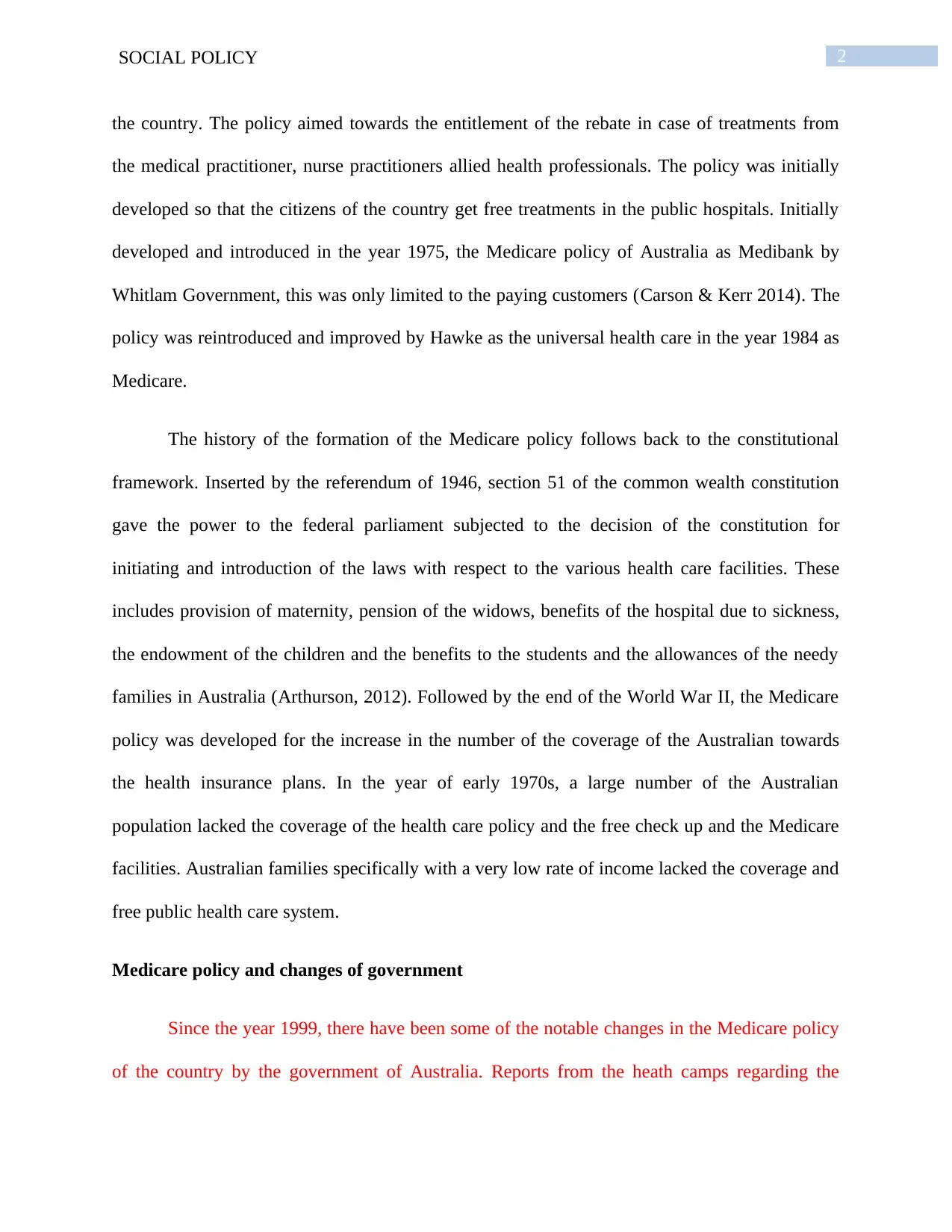
2SOCIAL POLICY
the country. The policy aimed towards the entitlement of the rebate in case of treatments from
the medical practitioner, nurse practitioners allied health professionals. The policy was initially
developed so that the citizens of the country get free treatments in the public hospitals. Initially
developed and introduced in the year 1975, the Medicare policy of Australia as Medibank by
Whitlam Government, this was only limited to the paying customers (Carson & Kerr 2014). The
policy was reintroduced and improved by Hawke as the universal health care in the year 1984 as
Medicare.
The history of the formation of the Medicare policy follows back to the constitutional
framework. Inserted by the referendum of 1946, section 51 of the common wealth constitution
gave the power to the federal parliament subjected to the decision of the constitution for
initiating and introduction of the laws with respect to the various health care facilities. These
includes provision of maternity, pension of the widows, benefits of the hospital due to sickness,
the endowment of the children and the benefits to the students and the allowances of the needy
families in Australia (Arthurson, 2012). Followed by the end of the World War II, the Medicare
policy was developed for the increase in the number of the coverage of the Australian towards
the health insurance plans. In the year of early 1970s, a large number of the Australian
population lacked the coverage of the health care policy and the free check up and the Medicare
facilities. Australian families specifically with a very low rate of income lacked the coverage and
free public health care system.
Medicare policy and changes of government
Since the year 1999, there have been some of the notable changes in the Medicare policy
of the country by the government of Australia. Reports from the heath camps regarding the
the country. The policy aimed towards the entitlement of the rebate in case of treatments from
the medical practitioner, nurse practitioners allied health professionals. The policy was initially
developed so that the citizens of the country get free treatments in the public hospitals. Initially
developed and introduced in the year 1975, the Medicare policy of Australia as Medibank by
Whitlam Government, this was only limited to the paying customers (Carson & Kerr 2014). The
policy was reintroduced and improved by Hawke as the universal health care in the year 1984 as
Medicare.
The history of the formation of the Medicare policy follows back to the constitutional
framework. Inserted by the referendum of 1946, section 51 of the common wealth constitution
gave the power to the federal parliament subjected to the decision of the constitution for
initiating and introduction of the laws with respect to the various health care facilities. These
includes provision of maternity, pension of the widows, benefits of the hospital due to sickness,
the endowment of the children and the benefits to the students and the allowances of the needy
families in Australia (Arthurson, 2012). Followed by the end of the World War II, the Medicare
policy was developed for the increase in the number of the coverage of the Australian towards
the health insurance plans. In the year of early 1970s, a large number of the Australian
population lacked the coverage of the health care policy and the free check up and the Medicare
facilities. Australian families specifically with a very low rate of income lacked the coverage and
free public health care system.
Medicare policy and changes of government
Since the year 1999, there have been some of the notable changes in the Medicare policy
of the country by the government of Australia. Reports from the heath camps regarding the
⊘ This is a preview!⊘
Do you want full access?
Subscribe today to unlock all pages.

Trusted by 1+ million students worldwide
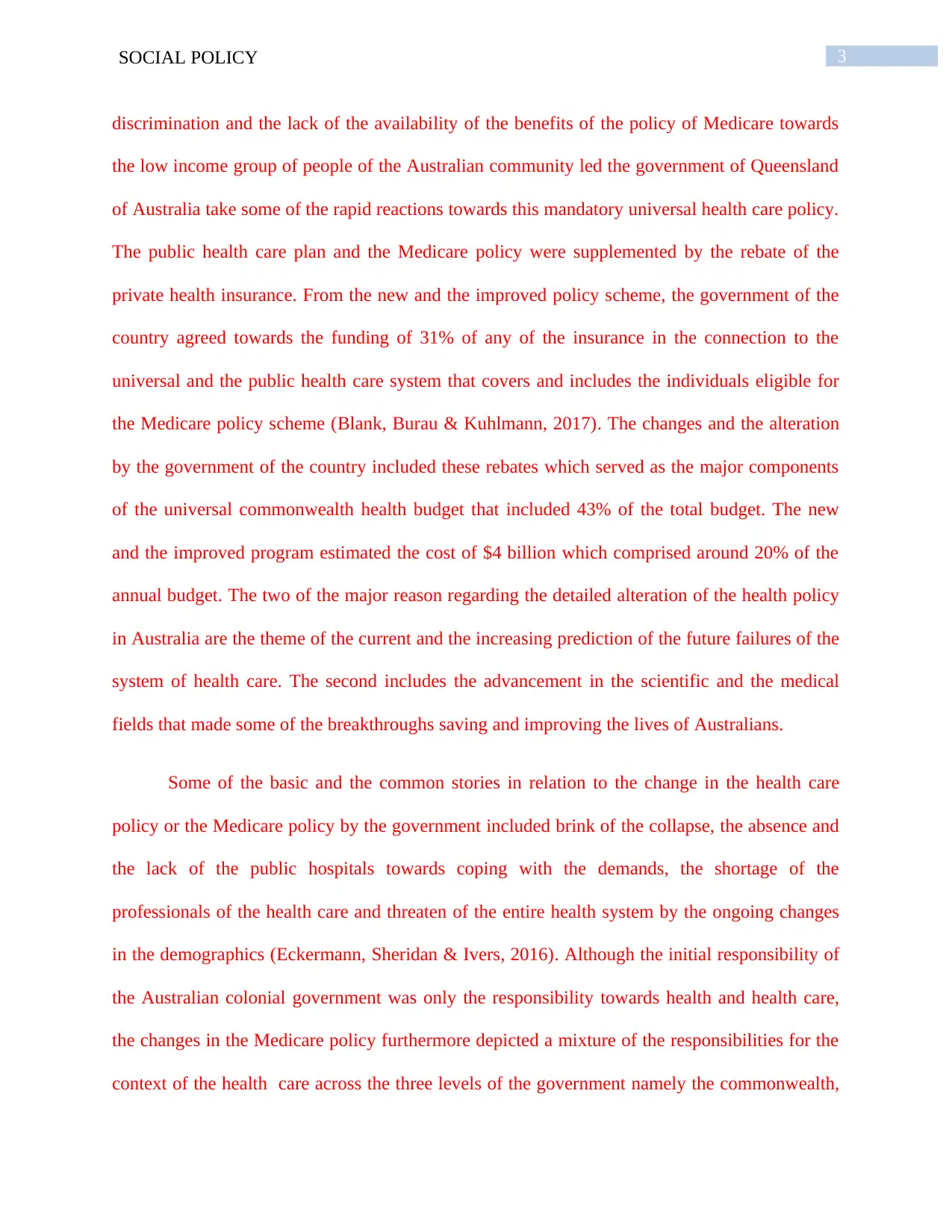
3SOCIAL POLICY
discrimination and the lack of the availability of the benefits of the policy of Medicare towards
the low income group of people of the Australian community led the government of Queensland
of Australia take some of the rapid reactions towards this mandatory universal health care policy.
The public health care plan and the Medicare policy were supplemented by the rebate of the
private health insurance. From the new and the improved policy scheme, the government of the
country agreed towards the funding of 31% of any of the insurance in the connection to the
universal and the public health care system that covers and includes the individuals eligible for
the Medicare policy scheme (Blank, Burau & Kuhlmann, 2017). The changes and the alteration
by the government of the country included these rebates which served as the major components
of the universal commonwealth health budget that included 43% of the total budget. The new
and the improved program estimated the cost of $4 billion which comprised around 20% of the
annual budget. The two of the major reason regarding the detailed alteration of the health policy
in Australia are the theme of the current and the increasing prediction of the future failures of the
system of health care. The second includes the advancement in the scientific and the medical
fields that made some of the breakthroughs saving and improving the lives of Australians.
Some of the basic and the common stories in relation to the change in the health care
policy or the Medicare policy by the government included brink of the collapse, the absence and
the lack of the public hospitals towards coping with the demands, the shortage of the
professionals of the health care and threaten of the entire health system by the ongoing changes
in the demographics (Eckermann, Sheridan & Ivers, 2016). Although the initial responsibility of
the Australian colonial government was only the responsibility towards health and health care,
the changes in the Medicare policy furthermore depicted a mixture of the responsibilities for the
context of the health care across the three levels of the government namely the commonwealth,
discrimination and the lack of the availability of the benefits of the policy of Medicare towards
the low income group of people of the Australian community led the government of Queensland
of Australia take some of the rapid reactions towards this mandatory universal health care policy.
The public health care plan and the Medicare policy were supplemented by the rebate of the
private health insurance. From the new and the improved policy scheme, the government of the
country agreed towards the funding of 31% of any of the insurance in the connection to the
universal and the public health care system that covers and includes the individuals eligible for
the Medicare policy scheme (Blank, Burau & Kuhlmann, 2017). The changes and the alteration
by the government of the country included these rebates which served as the major components
of the universal commonwealth health budget that included 43% of the total budget. The new
and the improved program estimated the cost of $4 billion which comprised around 20% of the
annual budget. The two of the major reason regarding the detailed alteration of the health policy
in Australia are the theme of the current and the increasing prediction of the future failures of the
system of health care. The second includes the advancement in the scientific and the medical
fields that made some of the breakthroughs saving and improving the lives of Australians.
Some of the basic and the common stories in relation to the change in the health care
policy or the Medicare policy by the government included brink of the collapse, the absence and
the lack of the public hospitals towards coping with the demands, the shortage of the
professionals of the health care and threaten of the entire health system by the ongoing changes
in the demographics (Eckermann, Sheridan & Ivers, 2016). Although the initial responsibility of
the Australian colonial government was only the responsibility towards health and health care,
the changes in the Medicare policy furthermore depicted a mixture of the responsibilities for the
context of the health care across the three levels of the government namely the commonwealth,
Paraphrase This Document
Need a fresh take? Get an instant paraphrase of this document with our AI Paraphraser
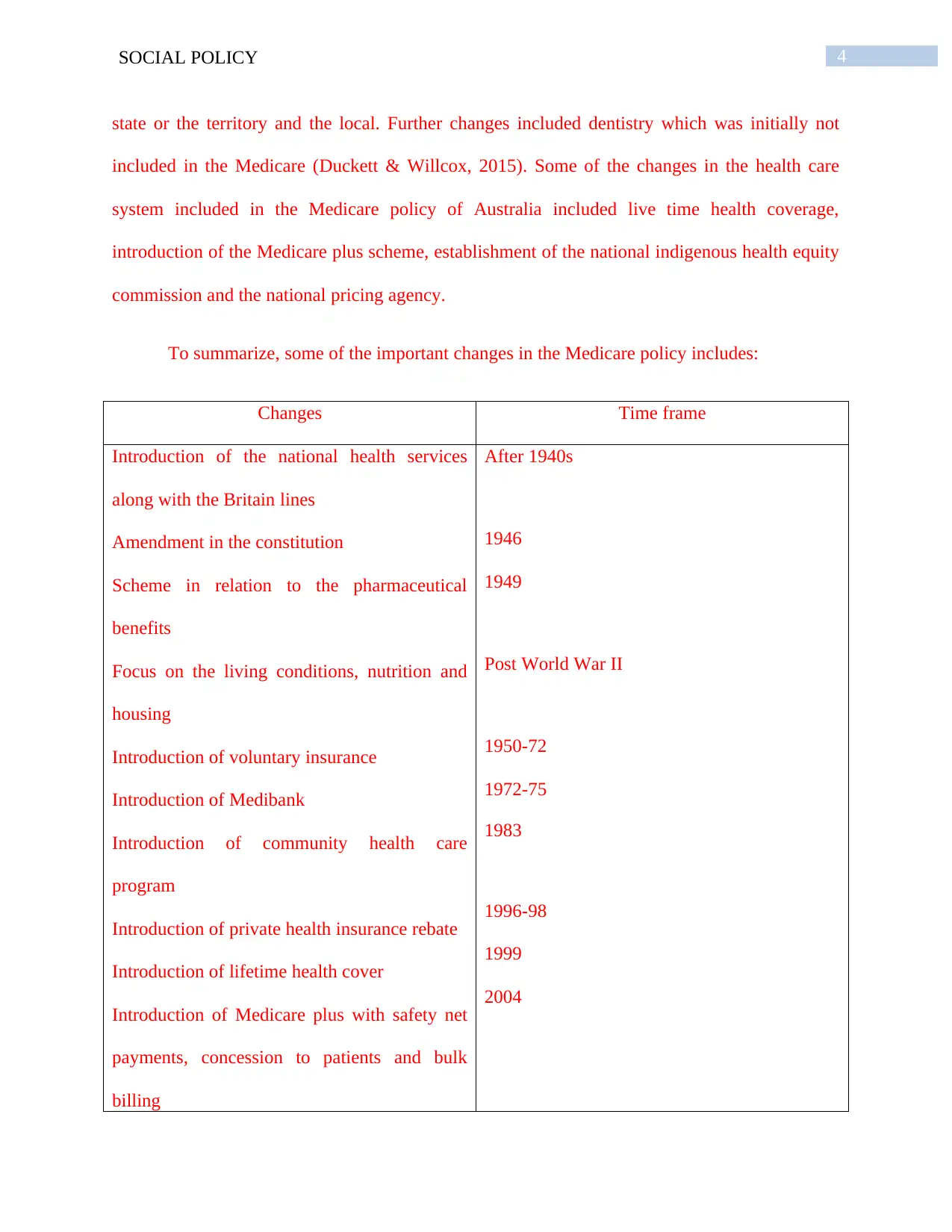
4SOCIAL POLICY
state or the territory and the local. Further changes included dentistry which was initially not
included in the Medicare (Duckett & Willcox, 2015). Some of the changes in the health care
system included in the Medicare policy of Australia included live time health coverage,
introduction of the Medicare plus scheme, establishment of the national indigenous health equity
commission and the national pricing agency.
To summarize, some of the important changes in the Medicare policy includes:
Changes Time frame
Introduction of the national health services
along with the Britain lines
Amendment in the constitution
Scheme in relation to the pharmaceutical
benefits
Focus on the living conditions, nutrition and
housing
Introduction of voluntary insurance
Introduction of Medibank
Introduction of community health care
program
Introduction of private health insurance rebate
Introduction of lifetime health cover
Introduction of Medicare plus with safety net
payments, concession to patients and bulk
billing
After 1940s
1946
1949
Post World War II
1950-72
1972-75
1983
1996-98
1999
2004
state or the territory and the local. Further changes included dentistry which was initially not
included in the Medicare (Duckett & Willcox, 2015). Some of the changes in the health care
system included in the Medicare policy of Australia included live time health coverage,
introduction of the Medicare plus scheme, establishment of the national indigenous health equity
commission and the national pricing agency.
To summarize, some of the important changes in the Medicare policy includes:
Changes Time frame
Introduction of the national health services
along with the Britain lines
Amendment in the constitution
Scheme in relation to the pharmaceutical
benefits
Focus on the living conditions, nutrition and
housing
Introduction of voluntary insurance
Introduction of Medibank
Introduction of community health care
program
Introduction of private health insurance rebate
Introduction of lifetime health cover
Introduction of Medicare plus with safety net
payments, concession to patients and bulk
billing
After 1940s
1946
1949
Post World War II
1950-72
1972-75
1983
1996-98
1999
2004
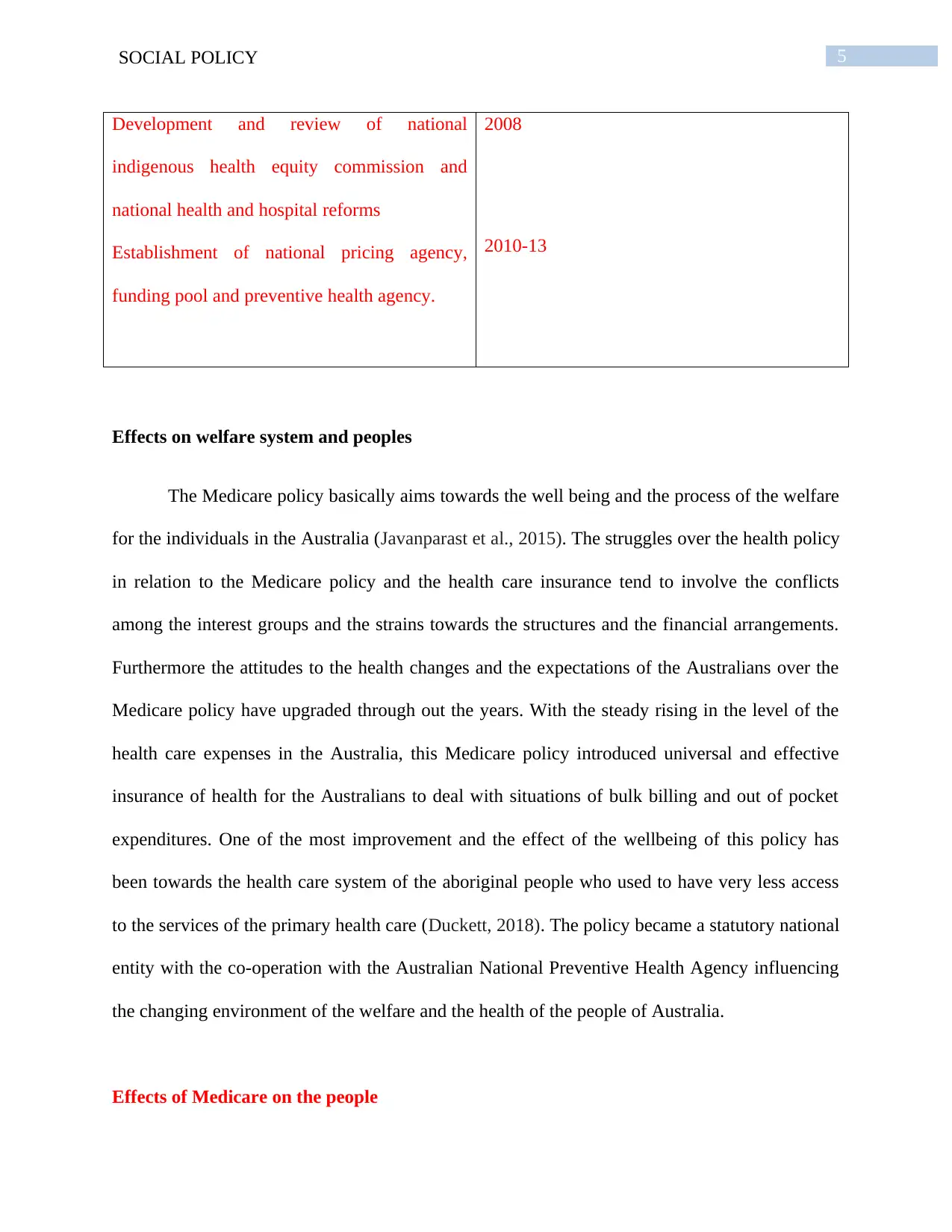
5SOCIAL POLICY
Development and review of national
indigenous health equity commission and
national health and hospital reforms
Establishment of national pricing agency,
funding pool and preventive health agency.
2008
2010-13
Effects on welfare system and peoples
The Medicare policy basically aims towards the well being and the process of the welfare
for the individuals in the Australia (Javanparast et al., 2015). The struggles over the health policy
in relation to the Medicare policy and the health care insurance tend to involve the conflicts
among the interest groups and the strains towards the structures and the financial arrangements.
Furthermore the attitudes to the health changes and the expectations of the Australians over the
Medicare policy have upgraded through out the years. With the steady rising in the level of the
health care expenses in the Australia, this Medicare policy introduced universal and effective
insurance of health for the Australians to deal with situations of bulk billing and out of pocket
expenditures. One of the most improvement and the effect of the wellbeing of this policy has
been towards the health care system of the aboriginal people who used to have very less access
to the services of the primary health care (Duckett, 2018). The policy became a statutory national
entity with the co-operation with the Australian National Preventive Health Agency influencing
the changing environment of the welfare and the health of the people of Australia.
Effects of Medicare on the people
Development and review of national
indigenous health equity commission and
national health and hospital reforms
Establishment of national pricing agency,
funding pool and preventive health agency.
2008
2010-13
Effects on welfare system and peoples
The Medicare policy basically aims towards the well being and the process of the welfare
for the individuals in the Australia (Javanparast et al., 2015). The struggles over the health policy
in relation to the Medicare policy and the health care insurance tend to involve the conflicts
among the interest groups and the strains towards the structures and the financial arrangements.
Furthermore the attitudes to the health changes and the expectations of the Australians over the
Medicare policy have upgraded through out the years. With the steady rising in the level of the
health care expenses in the Australia, this Medicare policy introduced universal and effective
insurance of health for the Australians to deal with situations of bulk billing and out of pocket
expenditures. One of the most improvement and the effect of the wellbeing of this policy has
been towards the health care system of the aboriginal people who used to have very less access
to the services of the primary health care (Duckett, 2018). The policy became a statutory national
entity with the co-operation with the Australian National Preventive Health Agency influencing
the changing environment of the welfare and the health of the people of Australia.
Effects of Medicare on the people
⊘ This is a preview!⊘
Do you want full access?
Subscribe today to unlock all pages.

Trusted by 1+ million students worldwide
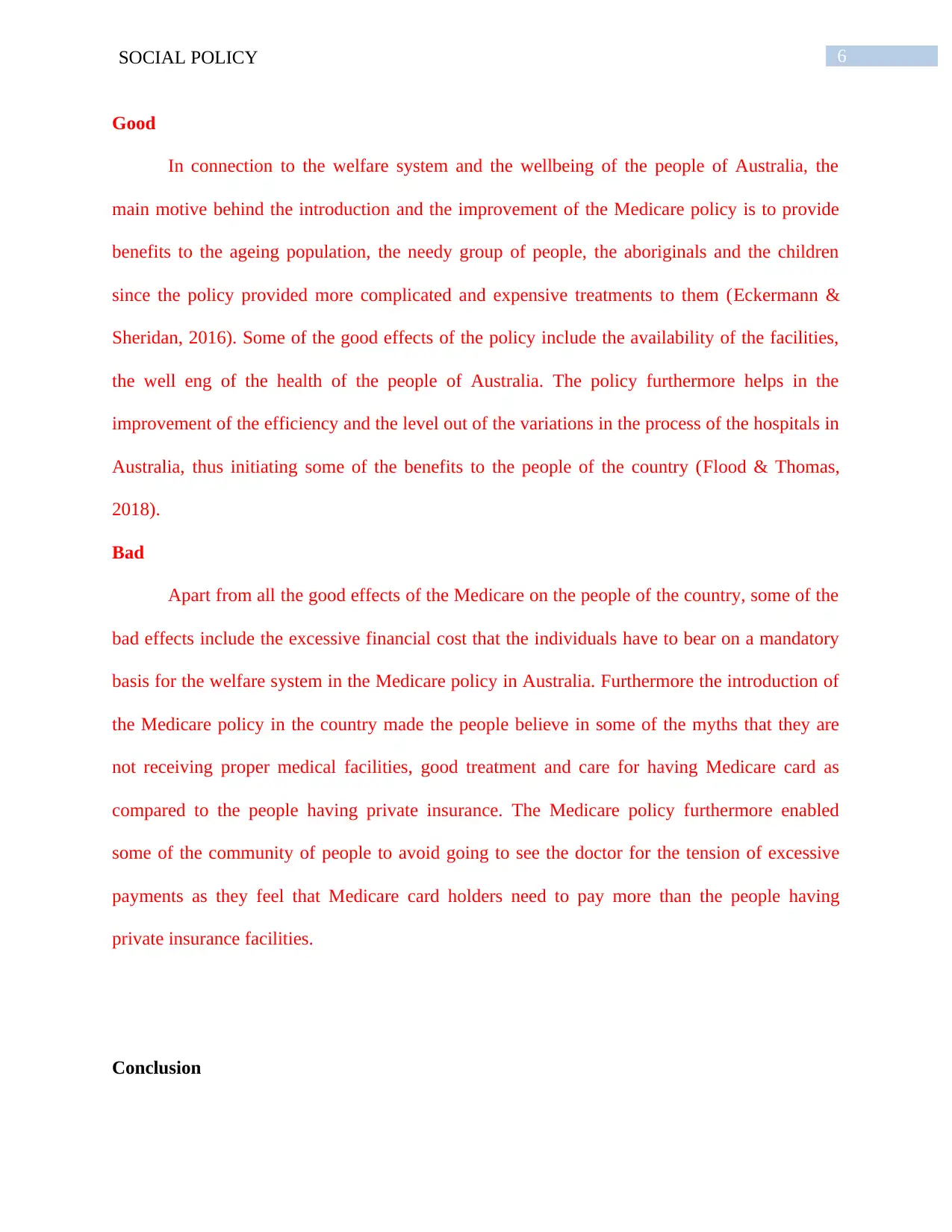
6SOCIAL POLICY
Good
In connection to the welfare system and the wellbeing of the people of Australia, the
main motive behind the introduction and the improvement of the Medicare policy is to provide
benefits to the ageing population, the needy group of people, the aboriginals and the children
since the policy provided more complicated and expensive treatments to them (Eckermann &
Sheridan, 2016). Some of the good effects of the policy include the availability of the facilities,
the well eng of the health of the people of Australia. The policy furthermore helps in the
improvement of the efficiency and the level out of the variations in the process of the hospitals in
Australia, thus initiating some of the benefits to the people of the country (Flood & Thomas,
2018).
Bad
Apart from all the good effects of the Medicare on the people of the country, some of the
bad effects include the excessive financial cost that the individuals have to bear on a mandatory
basis for the welfare system in the Medicare policy in Australia. Furthermore the introduction of
the Medicare policy in the country made the people believe in some of the myths that they are
not receiving proper medical facilities, good treatment and care for having Medicare card as
compared to the people having private insurance. The Medicare policy furthermore enabled
some of the community of people to avoid going to see the doctor for the tension of excessive
payments as they feel that Medicare card holders need to pay more than the people having
private insurance facilities.
Conclusion
Good
In connection to the welfare system and the wellbeing of the people of Australia, the
main motive behind the introduction and the improvement of the Medicare policy is to provide
benefits to the ageing population, the needy group of people, the aboriginals and the children
since the policy provided more complicated and expensive treatments to them (Eckermann &
Sheridan, 2016). Some of the good effects of the policy include the availability of the facilities,
the well eng of the health of the people of Australia. The policy furthermore helps in the
improvement of the efficiency and the level out of the variations in the process of the hospitals in
Australia, thus initiating some of the benefits to the people of the country (Flood & Thomas,
2018).
Bad
Apart from all the good effects of the Medicare on the people of the country, some of the
bad effects include the excessive financial cost that the individuals have to bear on a mandatory
basis for the welfare system in the Medicare policy in Australia. Furthermore the introduction of
the Medicare policy in the country made the people believe in some of the myths that they are
not receiving proper medical facilities, good treatment and care for having Medicare card as
compared to the people having private insurance. The Medicare policy furthermore enabled
some of the community of people to avoid going to see the doctor for the tension of excessive
payments as they feel that Medicare card holders need to pay more than the people having
private insurance facilities.
Conclusion
Paraphrase This Document
Need a fresh take? Get an instant paraphrase of this document with our AI Paraphraser
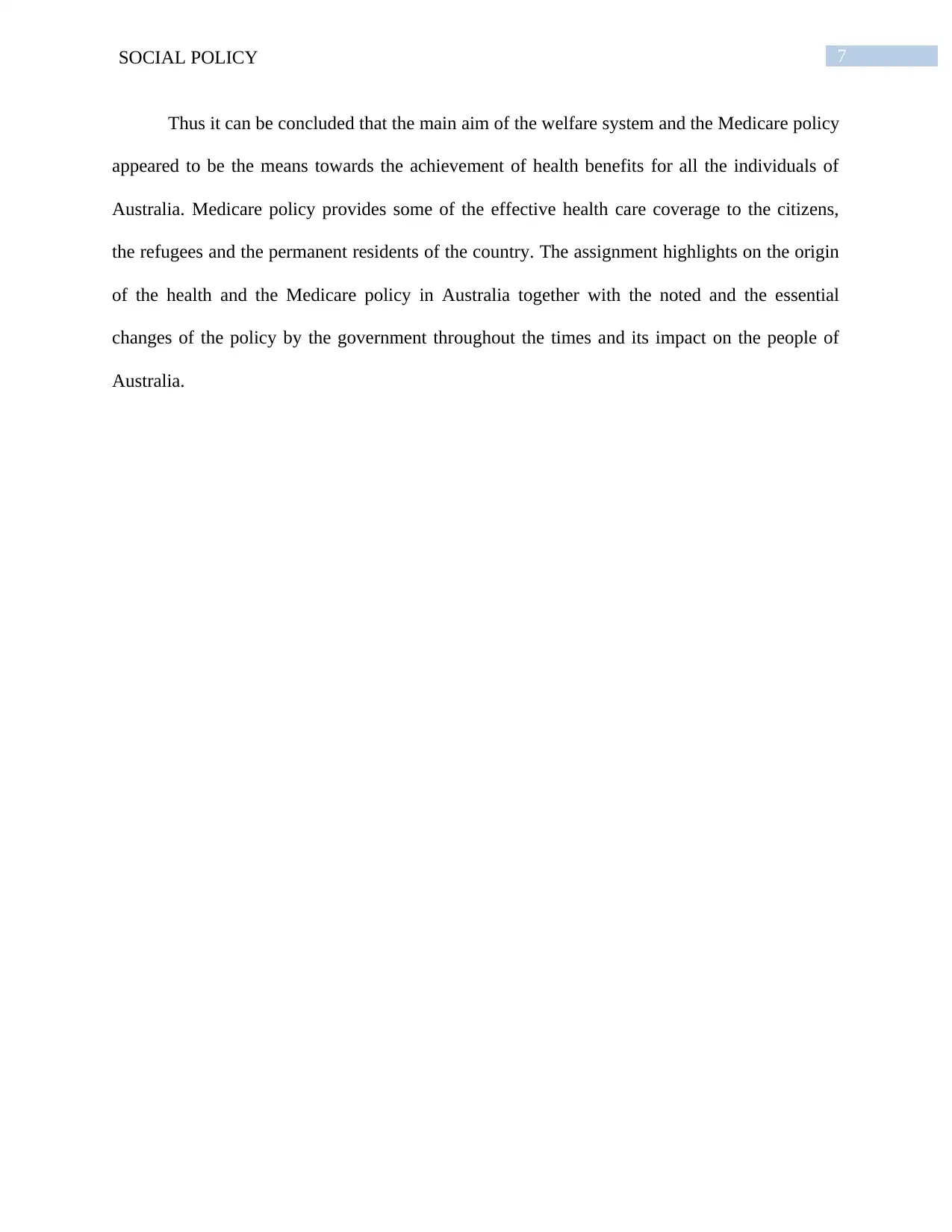
7SOCIAL POLICY
Thus it can be concluded that the main aim of the welfare system and the Medicare policy
appeared to be the means towards the achievement of health benefits for all the individuals of
Australia. Medicare policy provides some of the effective health care coverage to the citizens,
the refugees and the permanent residents of the country. The assignment highlights on the origin
of the health and the Medicare policy in Australia together with the noted and the essential
changes of the policy by the government throughout the times and its impact on the people of
Australia.
Thus it can be concluded that the main aim of the welfare system and the Medicare policy
appeared to be the means towards the achievement of health benefits for all the individuals of
Australia. Medicare policy provides some of the effective health care coverage to the citizens,
the refugees and the permanent residents of the country. The assignment highlights on the origin
of the health and the Medicare policy in Australia together with the noted and the essential
changes of the policy by the government throughout the times and its impact on the people of
Australia.
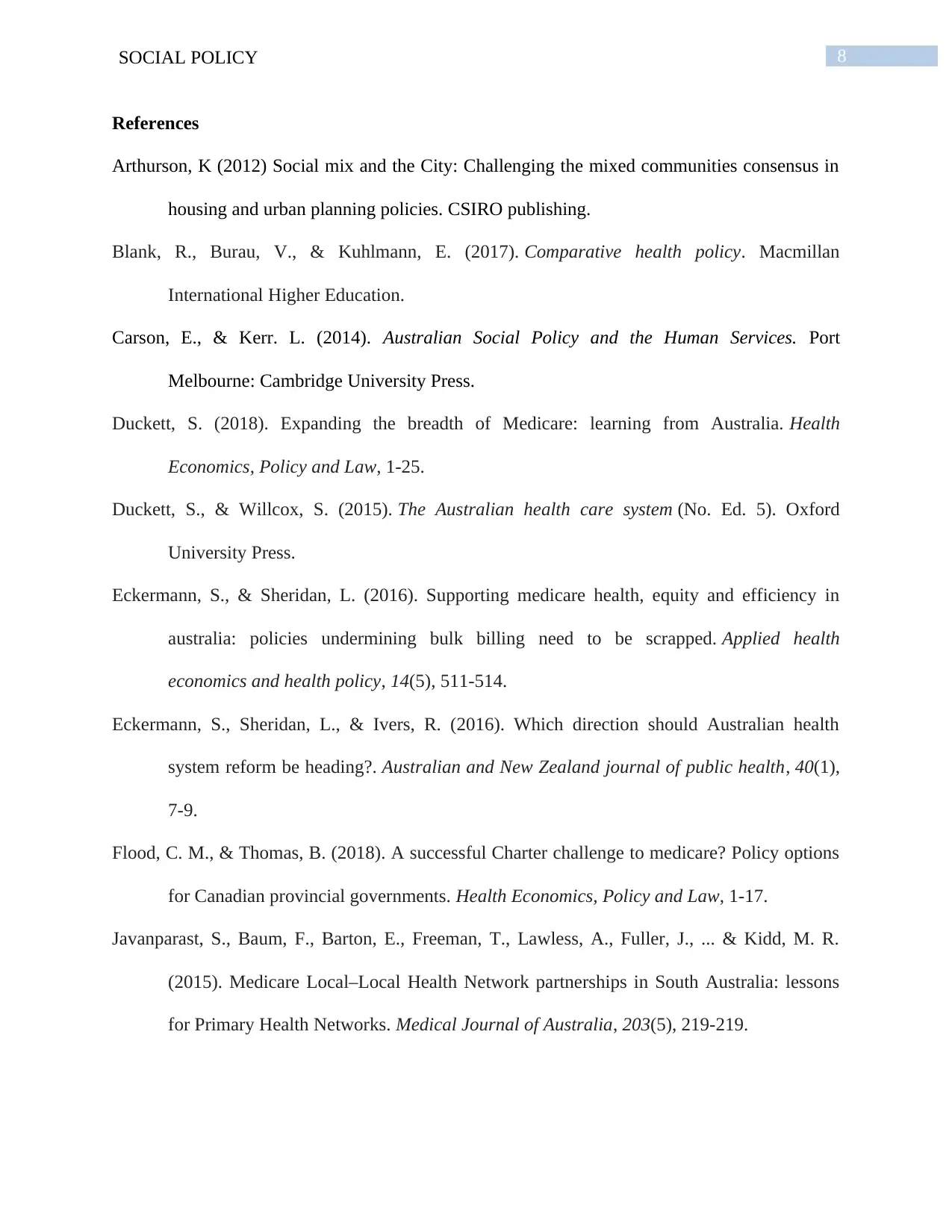
8SOCIAL POLICY
References
Arthurson, K (2012) Social mix and the City: Challenging the mixed communities consensus in
housing and urban planning policies. CSIRO publishing.
Blank, R., Burau, V., & Kuhlmann, E. (2017). Comparative health policy. Macmillan
International Higher Education.
Carson, E., & Kerr. L. (2014). Australian Social Policy and the Human Services. Port
Melbourne: Cambridge University Press.
Duckett, S. (2018). Expanding the breadth of Medicare: learning from Australia. Health
Economics, Policy and Law, 1-25.
Duckett, S., & Willcox, S. (2015). The Australian health care system (No. Ed. 5). Oxford
University Press.
Eckermann, S., & Sheridan, L. (2016). Supporting medicare health, equity and efficiency in
australia: policies undermining bulk billing need to be scrapped. Applied health
economics and health policy, 14(5), 511-514.
Eckermann, S., Sheridan, L., & Ivers, R. (2016). Which direction should Australian health
system reform be heading?. Australian and New Zealand journal of public health, 40(1),
7-9.
Flood, C. M., & Thomas, B. (2018). A successful Charter challenge to medicare? Policy options
for Canadian provincial governments. Health Economics, Policy and Law, 1-17.
Javanparast, S., Baum, F., Barton, E., Freeman, T., Lawless, A., Fuller, J., ... & Kidd, M. R.
(2015). Medicare Local–Local Health Network partnerships in South Australia: lessons
for Primary Health Networks. Medical Journal of Australia, 203(5), 219-219.
References
Arthurson, K (2012) Social mix and the City: Challenging the mixed communities consensus in
housing and urban planning policies. CSIRO publishing.
Blank, R., Burau, V., & Kuhlmann, E. (2017). Comparative health policy. Macmillan
International Higher Education.
Carson, E., & Kerr. L. (2014). Australian Social Policy and the Human Services. Port
Melbourne: Cambridge University Press.
Duckett, S. (2018). Expanding the breadth of Medicare: learning from Australia. Health
Economics, Policy and Law, 1-25.
Duckett, S., & Willcox, S. (2015). The Australian health care system (No. Ed. 5). Oxford
University Press.
Eckermann, S., & Sheridan, L. (2016). Supporting medicare health, equity and efficiency in
australia: policies undermining bulk billing need to be scrapped. Applied health
economics and health policy, 14(5), 511-514.
Eckermann, S., Sheridan, L., & Ivers, R. (2016). Which direction should Australian health
system reform be heading?. Australian and New Zealand journal of public health, 40(1),
7-9.
Flood, C. M., & Thomas, B. (2018). A successful Charter challenge to medicare? Policy options
for Canadian provincial governments. Health Economics, Policy and Law, 1-17.
Javanparast, S., Baum, F., Barton, E., Freeman, T., Lawless, A., Fuller, J., ... & Kidd, M. R.
(2015). Medicare Local–Local Health Network partnerships in South Australia: lessons
for Primary Health Networks. Medical Journal of Australia, 203(5), 219-219.
⊘ This is a preview!⊘
Do you want full access?
Subscribe today to unlock all pages.

Trusted by 1+ million students worldwide
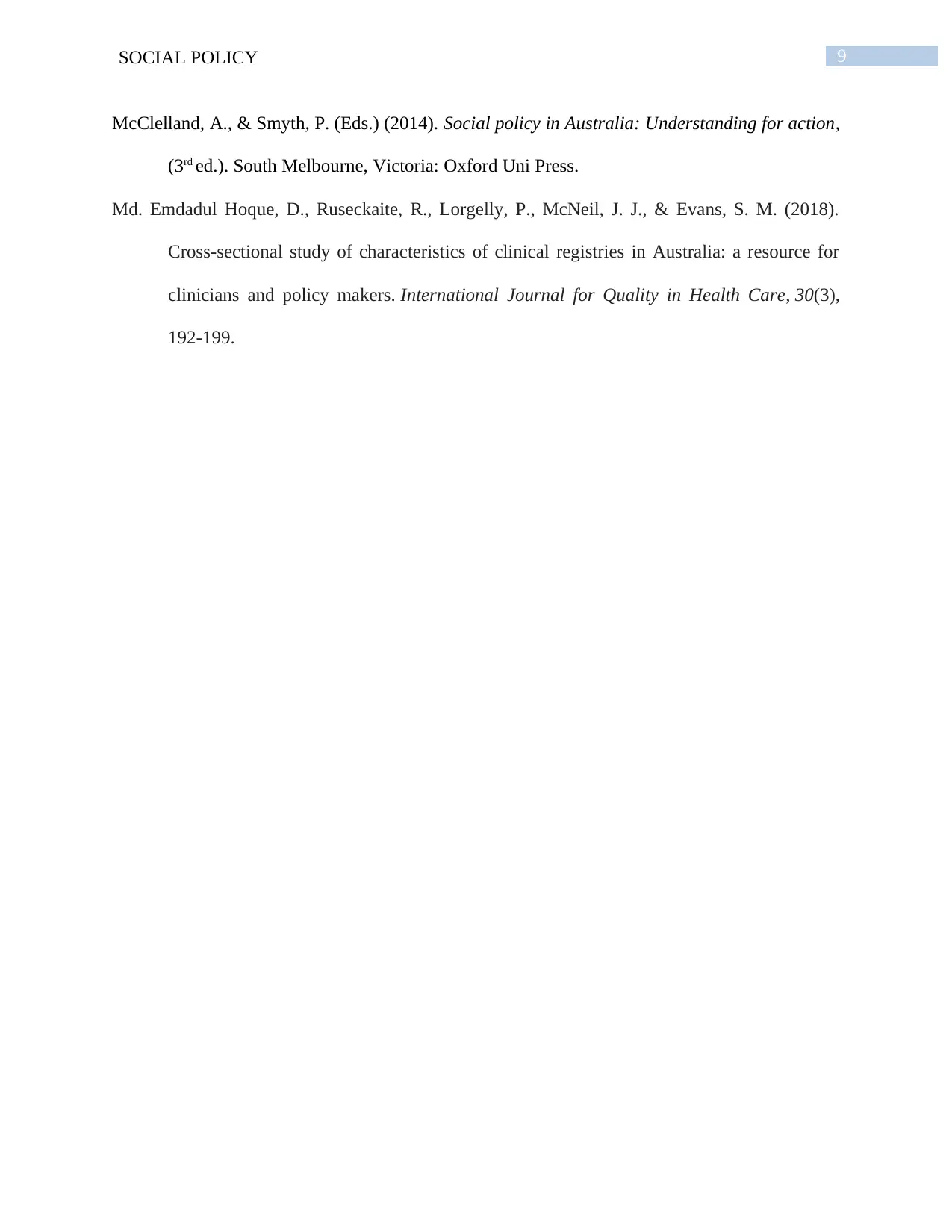
9SOCIAL POLICY
McClelland, A., & Smyth, P. (Eds.) (2014). Social policy in Australia: Understanding for action,
(3rd ed.). South Melbourne, Victoria: Oxford Uni Press.
Md. Emdadul Hoque, D., Ruseckaite, R., Lorgelly, P., McNeil, J. J., & Evans, S. M. (2018).
Cross-sectional study of characteristics of clinical registries in Australia: a resource for
clinicians and policy makers. International Journal for Quality in Health Care, 30(3),
192-199.
McClelland, A., & Smyth, P. (Eds.) (2014). Social policy in Australia: Understanding for action,
(3rd ed.). South Melbourne, Victoria: Oxford Uni Press.
Md. Emdadul Hoque, D., Ruseckaite, R., Lorgelly, P., McNeil, J. J., & Evans, S. M. (2018).
Cross-sectional study of characteristics of clinical registries in Australia: a resource for
clinicians and policy makers. International Journal for Quality in Health Care, 30(3),
192-199.
1 out of 10
Related Documents
Your All-in-One AI-Powered Toolkit for Academic Success.
+13062052269
info@desklib.com
Available 24*7 on WhatsApp / Email
![[object Object]](/_next/static/media/star-bottom.7253800d.svg)
Unlock your academic potential
Copyright © 2020–2025 A2Z Services. All Rights Reserved. Developed and managed by ZUCOL.





